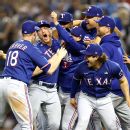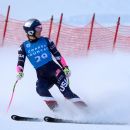What do the first two rounds of a perfect draft look like?
It’s March and Opening Day is quickly approaching. Fantasy baseball managers all over the world are getting ready for those ever-crucial drafts in order to stock their fantasy rosters with the talent that they hope will end up with a championship.
They say that practice makes perfect — and you can certainly practice your drafting skills in our Mock Draft Lobby — but that saying begs the question: What would a “perfect” draft even look like?
Tristan H. Cockcroft and Eric Karabell weighed in on each of their ideal picks from each of the 10 draft positions in an ESPN standard league in both of our primary fantasy baseball formats (points-based scoring and rotisserie). Additionally, Tristan and Eric have offered up the perfect complements to these first-round selections to be grabbed in Round 2.
Draft slot No. 1
Cockcroft (points-based leagues): Round 1 – Ronald Acuna Jr., Round 2 – Rafael Devers
After an early-March scare with his knee, Acuna appears to be on track for Opening Day, even taking live batting practice this week. That reestablishes him as the universal No. 1 overall pick regardless of format — an unexpected development for those of us in points-based leagues who once worried about his elevated strikeout rate. Acuna has improved in that department by leaps and bounds and, to put his production into perspective, he could have hit five fewer home runs, stolen 35 fewer bases and struck out 50 more times in 2023 and still been the top-scoring hitter — easily!
Acuna is automatic, but there are increasing questions surrounding the top tier of starting pitchers. Gerrit Cole‘s elbow injury and, to a lesser (albeit relevant) extent, Kevin Gausman‘s shoulder issues and Logan Webb‘s poor spring will cause the team with the No. 1 pick in a points league to face a potentially challenging path to building a pitching staff. If eight starting pitchers go in the 18 picks between their first two selections, the No. 1 team could be pressed to reach for a starter or chance it on what might remain come Rounds 4-5. None of Webb, Zac Gallen, Framber Valdez, George Kirby, Aaron Nola, Tyler Glasnow or Yoshinobu Yamamoto is outrageous as Picks 20/21, but Devers shouldn’t escape the second round.
A fun twist: This team could end up stacking a trio of “Juniors” in the first three rounds, between Bobby Witt Jr. and Fernando Tatis Jr. having outside chances at lingering until the Rounds 2-3 turn and Vladimir Guerrero Jr. highly likely to still be there.
Karabell (rotisserie leagues): Round 1 – Acuna, Round 2 – Francisco Lindor
No argument on Acuna. We presume he can’t possibly have “that season” again, but there is little argument for anyone else at the top. There is ample argument, for those in points formats, to get one of the few ace starting pitchers early, but I still intend to build rosters with a strong offensive baseline. Lindor went 31/31 last season. Perhaps he does it again.
Draft slot No. 2
Cockcroft: Round 1 – Juan Soto, Round 2 – Tatis
In any other season, Soto in pinstripes, helped by Yankee Stadium’s short right-field porch, coming off an outstanding spring training and playing his contract year, might shape up as the No. 1 overall pick in a points league. Here, he’s pure perfection as the No. 2 overall pick. Pairing him with former teammate Tatis — a better roto than points player but still a top-20 universal performer — is a great start, despite filling two outfield spots right off the bat.
Karabell: Round 1 – Julio Rodriguez, Round 2 – Austin Riley
J-Rod went 32/37 in his second season, leaving no doubt that his rookie campaign was legit. As you can see, I am partial to those who provide power and speed together. It is more valuable in roto formats, but it is always valuable. Riley isn’t likely to steal myriad bases, but his is a safe power profile.
Draft slot No. 3
Cockcroft: Round 1 – Mookie Betts, Round 2 – Pablo Lopez
Betts’ versatility is highly appealing, as he’ll begin 2024 qualified at both second base and outfield, and will add shortstop eligibility after 10 games there. He also has good odds of another 500-point season, making him the clear No. 3 pick. Lopez, meanwhile, tends to be underrated in points leagues but draws a second-round valuation in my book.
Karabell: Round 1 – Witt, Round 2 – Devers
Witt went 30/49 in his second season. Oh my! Sure, we would like more walks and a better OBP, but this is another building-block player, and at middle infield.
Draft slot No. 4
Cockcroft: Round 1 – Spencer Strider, Round 2 – Aaron Judge
Drafting pitchers early doesn’t feel good this season, which runs counter to the time-tested, points league strategy that practically demands building around an elite arm. With Cole (elbow) now injured, Strider stands alone as the consensus No. 1 starting pitcher. Strider lapped the field in strikeouts by 44, his 2023 ERA was undone by a couple of unexpectedly hideous outings, and he has been “lights out” so far this spring. He belongs ahead of anyone in the points-league ranks besides Acuna, Soto and Betts. Judge, meanwhile, makes a compelling case for as much as a first-round valuation and, despite his injury risk, shouldn’t linger much longer than this.
Karabell: Round 1 – Corbin Carroll, Round 2 – Matt Olson
No surprises here. Carroll enjoyed his own incredible rookie campaign and it came with a strong walk rate. Olson just hit 54 home runs, and he walked 104 times. Investing in Atlanta hitters seems like it just might be a wise strategy.
Draft slot No. 5
Cockcroft: Round 1 – Kyle Tucker, Round 2 – Witt
Here’s a pair of dream rotisserie picks but they’re pretty darned good in points leagues, too. Tucker scored 524 fantasy points last season, seventh in the league, with one of the most well-rounded skill sets in the game. Remember, getting a strong return from your first-round pick matters, and he’s a prime-age 27 with one of the highest statistical floors in baseball. Witt, meanwhile, had a 14th-best 478 fantasy points, and he’s still only 23 years old with an arrow pointing way up.
Karabell: Round 1 – Tucker, Round 2 – Judge
Tucker is another provider of both home runs and stolen bases, but check out the 12% walk rate. We like that patience breakout. Investing in Judge requires its own patience, as durability is not a strength. Of course, the statistical upside is. Judge might not be for everyone, but it seems unlikely that a fellow who clubbed 62 home runs in 2022 slips far.
Draft slot No. 6
Cockcroft: Round 1 – Jose Ramirez, Round 2 – Shohei Ohtani
Here are two of the four players who have scored at least 450 fantasy points in each of the past three seasons, alongside Cole and Freddie Freeman. Ohtani’s path to a fourth straight such campaign is more difficult, as he will serve as a hitter only while recovering from September 2023 elbow surgery, but he’s in about the most favorable circumstances in baseball in which to do so, batting between Betts and Freeman.
Karabell: Round 1 – Betts, Round 2 – Bryce Harper
New positions, no problem. As we keep noting, Betts should add SS eligibility to 2B/OF early in April. Harper is now no longer an outfielder, but rather a first baseman. We don’t care. The numbers should be there for both.
Draft slot No. 7
Cockcroft: Round 1 – Freeman, Round 2 – Kevin Gausman
Freeman has scored 168 more fantasy points than any other hitter during the past five seasons and has managed at least 450 in six of the last seven full campaigns. His reliability makes him plenty worth a mid-to-late first-round pick. On the swing back, starting pitching seems the likely target, and if a Corbin Burnes or Luis Castillo doesn’t last to this spot, Gausman is well worth taking ahead of Lopez.
Karabell: Round 1 – Freeman, Round 2 – Strider
Freeman feels like a bargain this late in Round 1. I might have to move him up some. Remember, it is not all about how many home runs a fellow blasts. Durability and a safe batting average matter, too. Strider is the lone pitcher in the first two rounds for me and, to be honest, I might just take the best hitter available anyway. Hitters are safer.
Draft slot No. 8
Cockcroft: Round 1 – Zack Wheeler, Round 2 – Carroll
Only Cole (1,573) and Burnes (1,492) have scored more fantasy points over the past three seasons than Wheeler (1,396), one of the most consistently reliable starting pitchers in all of baseball. With the injury questions surrounding Cole, Wheeler has suddenly emerged as a viable, first-round pick for points league managers. Carroll, meanwhile, managed a top-12 fantasy point total among hitters in what was his rookie season. He’s already one of fantasy’s best building blocks, regardless of format.
Karabell: Round 1 – Tatis, Round 2 – Ramirez
Tatis and Ramirez were both top-five overall fantasy assets not too long ago. They could both potentially return to that level again.
Draft slot No. 9
Cockcroft: Round 1 – Olson, Round 2 – Burnes
Olson scored 496 fantasy points in 2021, 13th-best in the league, then raised the bar with a fourth-best 571 last season. He’s also the cleanup hitter in one of baseball’s deepest lineups, earning this valuation. Burnes, despite declining in fantasy production by 110 points last season, remains one of the position’s best.
Karabell: Round 1 – Trea Turner, Round 2 – Yordan Alvarez
Turner is a better roto option for sure, but there is safety and reliability in his numbers, too. He hits for relevant power. He runs. He scores runs. And by the way, stealing 30 bases with nary a caught stealing is historic and incredibly valuable in fantasy.
Draft slot No. 10
Cockcroft: Round 1 – Alvarez, Round 2 – Castillo
There’s injury risk throughout the first and second rounds, but Alvarez has been one of the game’s most productive hitters when on the field. Meanwhile, Castillo is one of its most reliable starting pitchers. Both players stand excellent odds of reaching the 450-point plateau in fantasy terms this season.
Karabell: Round 1 – Soto, Round 2 – Ohtani
It’s Soto and Ohtani.


